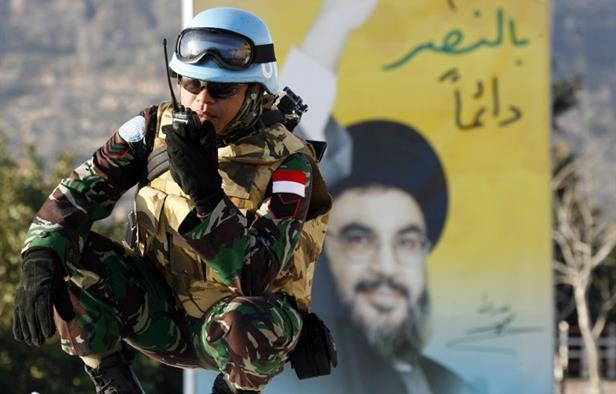Nasrallah’s New engagement rules pose challenge for the Lebanese government
Antoine Ghattas Saab/The Daily Star/Feb. 03, 2015
By shattering the rules of engagement with Israel and imposing a new political and security equation, Hezbollah leader Sayyed Hasan Nasrallah has presented the Lebanese government with a tough challenge regarding its commitment to U.N. resolutions, political sources said.
The government will have to decide between its declared commitment to U.N. Resolution 1701 and the disassociation policy regarding the conflict in Syria, as well as the obligations of the Baabda Declaration on the one hand, and allowing Hezbollah to monopolize the decision of war and peace on the other, the sources said.
Resolution 1701 ended the 34-day devastating war between Israel and Hezbollah in 2006.
The Baabda Declaration, endorsed by rival Lebanese leaders during a National Dialogue session chaired by then-President Michel Sleiman at Baabda Palace in June 2012, called for distancing Lebanon from regional and international conflicts, particularly the conflict in Syria.
Officials from the Future Movement and their March 14 allies have slammed Nasrallah’s speech last week in which he announced that the rules of engagement between Hezbollah and Israel had ended.
In his speech, which came two days after Hezbollah fighters ambushed an Israeli military convoy in the occupied Shebaa Farms, killing two soldiers in retaliation for the Israeli airstrike that killed six party fighters and a top Iranian general in Syria’s Golan Heights on Jan. 18, Nasrallah warned that his group would respond to any Israeli attack at any time and in any place.
Ministerial sources in the March 14 coalition said the majority of Lebanese have become concerned about the situation in their country in light of the defiance declared by Hezbollah leaders and Iranian political and military officials.
The March 14 parties are currently reassessing the latest developments before taking a firm stance on three fronts, the sources said.
First, in their assessment of the period from Feb. 14 – the anniversary of the 2005 assassination of former Prime Minister Rafik Hariri – to Mar. 14 – the anniversary of the Independence Uprising – the March 14 parties will come up with recommendations affirming the coalition’s continued struggle to consolidate independence, sovereignty, freedom, democracy and a comprehensive national reconciliation, the sources said.
Second, March 14 ministers are expected to ask their March 8 and Hezbollah counterparts in the government questions dealing with the exclusivity of the Lebanese state in declaring war, despite the knowledge that the government was formed as a result of an American-Saudi-Iranian consensus and the stance of these three countries so far is not to topple it, according to the sources.
Third, the Future Movement delegation will raise during the fifth round of dialogue with Hezbollah officials Tuesday the issue of unruly gunmen who fired celebratory gunfire in parts of Beirut and the southern suburbs before and after Nasrallah delivered his speech and the consequences of Hezbollah’s military intervention in Syria, as well as other issues, such as the Hezbollah-linked Resistance Brigades.
According to the same sources, Hezbollah’s new military equation calls on the March 14 parties to adopt a new practical approach because the most serious part in Nasrallah’s speech was that he has shattered all rules of engagement with Israel, unilaterally taken the decision to go to war with Israel and spelled out new enemies – the jihadi groups – while retaining the right to respond to them.
The sources said the government, with good intentions, has declared that Hezbollah’s retaliatory attack in the Shebaa Farms did not violate Resolution 1701 and did not cross the Blue Line, while it, along with the international community know it was a breach.
Therefore, after Hezbollah violated the international guarantee through the party’s “Communique No. 1” on the Shebaa attack, the government is left with two choices: either to take a different stance or publicly call on the international community to abolish this resolution and replace it with Hezbollah’s guarantee, the sources said.
While waiting to see how internal political parties would react to the consequences entailed by the change in the rules of engagement between Hezbollah and Israel, the sources pointed out that there is about one month before the Security Council issues its regular report on the implementation of Resolution 1701.
If the reports says that the Lebanese government had provided a political cover for the Shebaa operation, it would then face a predicament, as it would be impossible for it to ask the international community for military aid for the Army and security forces and assistance to Syrian refugees, while it is shelteringa Lebanese party bent on violating one of the resolutions of this community, the sources said.






















